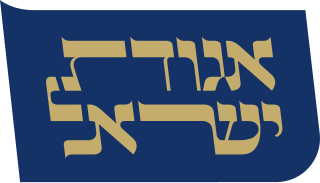
Haredi Judaism is a branch of Orthodox Judaism that is characterized by its strict interpretation of religious sources and its accepted halakha and traditions, in opposition to more accommodating or modern values and practices. Its members are usually referred to as ultra-Orthodox in English; a term considered pejorative by many of its adherents, who prefer the terms strictly Orthodox or Haredi. Haredim regard themselves as the most authentic custodians of Jewish religious law and tradition which, in their opinion, is binding and unchangeable. They consider all other expressions of Judaism, including Modern Orthodoxy, as deviations from God's laws, although other movements of Judaism would disagree.

Neturei Karta is a Haredi Jewish group.

Agudat Yisrael is a Haredi Jewish political party in Israel. It began as a political party representing Haredi Jews in Poland, originating in the Agudath Israel movement in Upper Silesia. It later became the party of many Haredim in Israel. It was the umbrella party for many, though not all, Haredi Jews in Israel until the 1980s, as it had been during the British Mandate of Palestine.

Mordechai Tzemach Eliyahu, was an Israeli rabbi, posek, and spiritual leader.
Off the derech is a Yeshiva-English expression used to describe the state of a Jew who has left an Orthodox way of life or community, and whose new lifestyle is secular, non-Jewish, or of a non-Orthodox form of Judaism, as part of a contemporary social phenomenon tied to the Digital, Postmodern and Post-postmodern eras. In its broadest sense it can also include those changing to a milder form of Orthodoxy. Despite the term's pejorative and controversially dichotomic and definitive nature, it has become popular in use among Orthodox people, is found in mainstream literature, and has also been reclaimed by some OTD individuals.

Cinema of Israel refers to film production in Israel since its founding in 1948. Most Israeli films are produced in Hebrew, but there are productions in other languages such as Arabic and English. Israel has been nominated for more Academy Awards for Best Foreign Language Film than any other country in the Middle East.

A Gesheft is a 2005 action film, with a religious message, in the Yiddish language, made by Haredi Jews from Monsey, New York. It is the first film made by Haredi Jews entirely in Yiddish. It is one of very few Yiddish films made since the destruction of most Yiddish-speaking communities by the Nazis. The film has been marketed primarily to an Orthodox audience, not without some controversy. It has also drawn attention from less traditionalist Jews with an interest in Yiddish, since it is a document of contemporary spoken Yiddish. For example, it was screened at the 2006 Ashkenaz Festival in Toronto, a mostly secular celebration of klezmer music and Yiddish culture.
Yossele Schumacher is a Soviet-born Israeli whose abduction as a child in 1960 became a cause célèbre within Israeli Jewish society. Schumacher was abducted by his Haredi Orthodox Jewish grandparents to prevent him from being raised as a secular Jew by his parents, and was found in the United States after an extensive international search by Mossad before being returned to his parents' custody. Schumacher's abduction led to an early major polarization among Israeli Jews due to disagreements between Haredi Jews, who largely supported the abduction, and Secular Jews, who largely opposed it.
In Judaism, especially in Orthodox Judaism, there are a number of settings in which men and women are kept separate in order to conform with various elements of halakha and to prevent men and women from mingling. Other streams of Judaism rarely separate genders any more than secular western society.

The "Haredi burqa sect" is a community of Haredi Jews that ordains the full covering of a woman's entire body and face, including her eyes, for the preservation of modesty in public. In effect, the community asserts that a Jewish woman must not expose her bare skin to anyone but her husband and immediate family. The garment in question, known as a shal, is also referred to as a frumka—a portmanteau of the Yiddish-language word frum and the Arabic-language word burqa. The Haredi burqa sect, with an estimated population of several hundred people as of 2011, is primarily concentrated in Israel, and particularly in the Israeli city of Beit Shemesh. These Haredim rarely leave their homes; the married women who do come out in public are accompanied by their daughters, who also don long robes.
Kosher tourism is tourism which is geared mostly towards Orthodox Jews. The accommodations in these destinations include kosher foods, and are within walking distance of Orthodox synagogues. Flights to these destinations often have kosher airline meals available.
Danielle Jadelyn is an Israeli-British actress and filmmaker.

Kikar HaShabbat is a Hebrew–language Israeli news website directed toward Haredi audience. It is named after an intersection in Jerusalem in a neighbourhood inhabited by Haredi Jews. A Globes study in 2017 found it as Israel's 9th most used news website.

Sacred Sperm is a 2014 Israeli documentary film directed by Ori Gruder, exploring the taboo of masturbation in Judaism. The TV version of the film world premiered at the 22nd Raindance Film Festival in October 2014 and was nominated in the short documentary film category at the end of 2014 Ophir Awards. The theatrical long version of the movie premiered at the 30th Santa Barbara Film Festival in February 2015. The Eastern Europe Premier was at the 55th Kraków International Film Festival mid 2015. This movie won the Accolade Global Film Competition - Award of Excellence at December 2014 and took the first prize Best Documentary at the 18th Religion Today Int' film festival in Italy at October 2015 and has been screened at more than 30 film festivals worldwide. The educational channel of Sweden screened the film during 2015 and it was chosen to be in the 10th most popular films of the year. Since the TV version became online In Israel itself already more than half a million viewers watched it through Hot, ynet and VOD options.
Jewish Israeli stone-throwing refers to criminal rock-throwing activity by Jewish Israelis in Mandatory Palestine, Israel, the West Bank, the Gaza Strip and Jerusalem. It includes material about internecine stone-throwing, in which Haredi Jews throw stones at other Jews as a protest against what they view as violations of religious laws concerning Shabbat, modest clothing for women and similar issues, and material about stone-throwing by extremists in the settler movement.
Tali Avrahami is an Israeli filmmaker, producer, entertainer, and educator; a Chabad hasidic woman, who creates films aimed at an audience of haredi women.
Yoel, Israel & Pashkavils is a 2006 Israeli documentary film on the Haredi Jews in Israel who have replaced popular media outlets such as television with the pashkvil or protest poster. The film follows Yoel Krause, a member of the Naturei Karta Haredi sect, who collects these posters. The documentary was directed by filmmaker Lina Chaplin.
Nayes is a 2020 Israeli television documentary series aired on Israel Channel 11 covering the Haredi Jewish media outlets in Israel.

Yona Rozenkier is an Israeli actor, writer and filmmaker.

The conscription of yeshiva students to the Israeli Defense Forces has been a highly contentious issue in Israel and outside it for decades now, at least since 1977.










